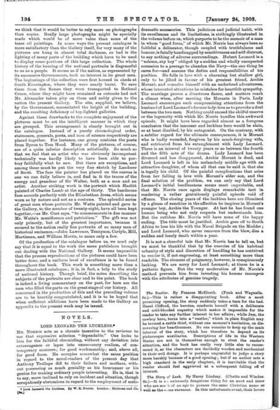NOVELS.
LORD LEONARD THE LUCKLESS.*
MR. NORRIS acts as a chronic incentive to the reviewer to use that expressive solecism " dependable." One looks to him for the faithful chronicling, without any deviation into extravagance or lapse into unnecessary realism, of con- temporary manners ; for good workmanship ; and, above all, for good form. He occupies somewhat the same position in regard to the novel-readers of the present day that Anthony Trollope did to their fathers and mothers, with- out possessing as much geniality as his forerunner or his genius for making ordinary people interesting. He is, that is to say, more inclined to rely on incident and situation, though scrupulously abstemious in regard to the employment of melo-
-
• Lord Laniard th• Lucklasa. By W. E. Norris. London ; Methuen and Co. 0&.1 dramatic accessories. This judicious and judicial habit, with its excellences and its limitations, is strikingly illustrated in the volume before us, which purports to be the memoir of a, man in whom "good form," of which Mr. Norris has always been so faithful a delineator, though coupled with truthfulness and honour, is fatally handicapped by sensitiveness and self-distrust, to say nothing of adverse surroundings. Hubert Leonard is a "solemn, shy boy" obliged by a sudden and wholly unexpected accession to a peerage to abandon the Navy—the one thing he cares for—and assume the duties and responsibilities of his position. He falls in love with a charming but shallow girl, only to be jilted in favour of his greatest friend, Archie Morant, and consoles himself with an underbred adventuress, whose interested attentions he mistakes for heartfelt sympathy. The marriage proves a disastrous fiasco, and matters reach a climax when, after meeting the Morants in Paris, Lady Leonard encourages such compromising attentions from the husband of Lord Leonard's former lady-love as to provoke a duel between the two men. Nothing could exceed the skilful reserve or the ingenuity with which Mr. Norris handles this awkward episode. It might have been regarded almost as a foregone conclusion that the innocent and luckless hero would be slain, or at least disabled, by his antagonist. On the contrary, with a subtler regard for the ultimate consequences, it is Morant who is badly wounded, forgiven by his much-forgiving wife, and extricated from his entanglement with Lady Leonard. There is an interval of twenty years or so between the fourth and the fifth acts of the drama. Lady Leonard has been divorced and has disappeared, Archie Morant is dead, and Lord Leonard is left in his melancholy middle age with an attractive daughter, of whom all that can be said is that she is legally his child. Of the painful complications that arise from her falling in love with Morant's elder son, and the final solution of the problem, we can only say that Lord Leonard's initial heedlessness seems most improbable, and that Mr. Norris once again displays remarkable tact in rendering a rather gratuitously painful episode void of offence. The closing years of the luckless hero are illumined by a gleam of sunshine in the affection be inspires in PrIorant's younger boy, Archie the Younger. At last he has found one human being who not only respects but understands him. But the ruthless Mr. Norris will have none of the happy ending. The title must be justified. Archie goes of to South Africa to lose his life with the Naval Brigade on the Modder ; and Lord Leonard, who never recovers from the blow, dies a sudden and lonely death within a year.
It is not a cheerful tale that Mr. Norris has to tell us, but we must be thankful that by the exercise of his habitual urbanity of style and discretion of handling he has contrived to render it, if not engrossing, at least something more than readable. The element of poignancy, however, is conspicuously lacking. We are sorry for Lord Leonard; at times he is a pathetic figure. But the very moderation of Mr. Norris's method prevents him from investing his &mime isscompria with the attributes of genuine tragedy.






































 Previous page
Previous page